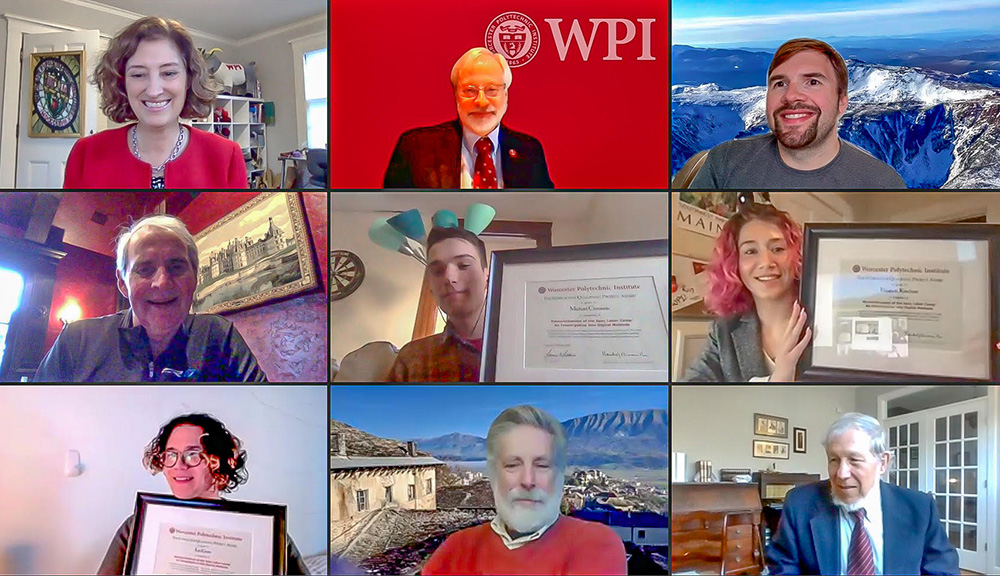WORCESTER, Mass. - Camp Reach, the award-winning science and engineering summer program for rising seventh-grade girls, celebrates its 10th anniversary at Worcester Polytechnic Institute (WPI) this month with engineering design projects that will see young girls developing creative solutions to problems faced by three Worcester organizations: how to create an accessible trail and bridge for Broad Meadow Brook Wildlife Sanctuary, how to best beautify the landscape at the Friendly House emergency shelter, and how to create a playground appropriate for the clients of Sherry’s House/Why Me, which provides support for families dealing with childhood cancer.
Camp Reach, which this year runs from July 23 to August 4 on the WPI campus, was founded in 1997 by Denise Nicoletti, associate professor of electrical and computer engineering at WPI, and Chrysanthe Demetry, associate professor of mechanical engineering, with a grant from the National Science Foundation. After Nicoletti died in a car accident 2002, the program was continued under Demetry’s direction, with the assistance of other WPI faculty and staff members.
In all, about 270 girls have completed the Camp Reach program. Nearly 30 middle school math and science teachers have served as instructors, learning more about career opportunities in science, math, and engineering and gaining new insight into the engineering design cycle, which is part of the Massachusetts Science/Technology Curriculum Framework. In addition, 50 area high school students-about half Camp Reach alumnae-have served as staff members.
In 2003, the Women in Engineering Programs & Advocates Network, a national nonprofit organization of over 600 individuals representing nearly 200 engineering schools, Fortune 500 corporations, and nonprofit organizations, bestowed its Women in Engineering Program Award on Camp Reach, honoring the program for its role in encouraging young women in engineering and science and for serving as an outstanding model program. The Camp Reach model was recently followed by organizers of Camp Success, a day camp for rising 7th and 8th grade girls and boys in South Carolina, which held its inaugural week-long sessions earlier this summer.
"The evidence is mounting," Demetry notes, "that Camp Reach is a milestone experience that contributes to young women’s interest and confidence in pursuing engineering and science majors in college."
Camp Reach has benefited from significant corporate and foundation support through the years. This year’s sponsors include 3M Corporation, the Albert W. Rice Charitable Foundation, AstraZeneca International, Bose Corporation, the Cardinal Brook Trust, IBM Corporation, Intel Corporation, Teradyne Inc., and WPI alumni and friends.
A summer residential program for Massachusetts girls with an interest in learning more about science and engineering careers, Camp Reach exposes participants to science and engineering concepts through discovery workshops and field trips, and gives them the chance to apply what they learn as they complete hands-on community service projects. This summer, students will pursue the following projects:
- Broad Brook Meadow Wildlife Sanctuary: Campers will recommend trail improvements, including a bridge over Broad Meadow Brook, to help this Massachusetts Audubon sanctuary develop a universally accessible trail to the Blackstone River Bikeway.
- Friendly House (87 Elm Street, Worcester): To help this emergency shelter for the homeless better serve its clients and present a more attractive face to its neighborhood, students will develop a proposal for a landscape beautification plan, including the dressing up of a dumpster and the repair of a historic iron fence.
- Sherry’s House/Why Me (1152 Pleasant Street, Worcester): As part of a project to make major improvements to the backyard of this house and activity center, the campers will make recommendations about playground equipment and surfacing that would be appropriate for children undergoing cancer treatment.
"These design projects represent a great partnership between WPI and nonprofits in Worcester," Demetry says. "Girls use the engineering design process to respond to real needs in our community, and they are empowered when adults listen to and follow through on their recommendations."
The project teams will meet with their sponsors on Tuesday, July 25, from 1:30-2:30 p.m., to learn about the specifications and constraints of the projects (Worcester City Councilor Barbara Haller ‘83 and former City Councilor Dennis Irish are scheduled to attend the meeting at Friendly House). They will spend the next few days gathering information and developing preliminary solutions.
On Monday, July 31, at approximately 1:30 p.m., the teams will visit their sponsors again to present their ideas and get feedback. The girls will then develop their final proposals, including budgets, parts lists, sketches, and schematics, and make presentations to the sponsors during the Camp Reach Closing Ceremonies on Friday, Aug. 4, starting at 3:30 p.m., in Olin Hall at WPI.
The 2006 Camp Reach design projects will likely join many others that have made a difference to for more than 20 local agencies and organizations since 1997. Here are some notable examples from the past two years:
- A 2005 project team designed a computer workstation for clients of the Elder Service Plan (now Summit Elder Care), an adult day program for seniors in Worcester. Their recommendations, which included an oversized keyboard and mouse, were also put in place at the Groveland Adult Day Health Care Center in Groveland, Calif., where they have improved the quality of life for clients.
- Another 2005 project team designed linens display and storage areas for the Donations Clearinghouse operated by the Central Massachusetts Housing Alliance.
- A 2004 project team helped the Central Massachusetts YMCA solve problems at two playgrounds: mulch being lost through a chain-link fence at one and crabapples falling from a nearby tree presenting a choking hazard to small children on another.
- Also in 2004, a team redesigned shelving and used other storage strategies to enable Hope Lodge of the American Cancer Society in Worcester to reorganize an overcrowded, unorganized storage room.
For more information on Camp Reach and this year’s engineering design projects, visit their Web site, or call 508-831-5819 or 774-242-7356 (cell).


